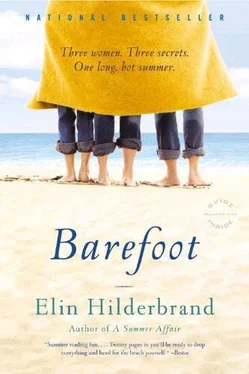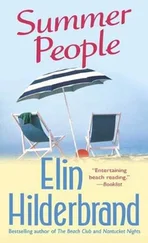Elin Hilderbrand - Barefoot - A Novel
Здесь есть возможность читать онлайн «Elin Hilderbrand - Barefoot - A Novel» весь текст электронной книги совершенно бесплатно (целиком полную версию без сокращений). В некоторых случаях можно слушать аудио, скачать через торрент в формате fb2 и присутствует краткое содержание. Жанр: Старинная литература, на английском языке. Описание произведения, (предисловие) а так же отзывы посетителей доступны на портале библиотеки ЛибКат.
- Название:Barefoot: A Novel
- Автор:
- Жанр:
- Год:неизвестен
- ISBN:нет данных
- Рейтинг книги:4 / 5. Голосов: 1
-
Избранное:Добавить в избранное
- Отзывы:
-
Ваша оценка:
- 80
- 1
- 2
- 3
- 4
- 5
Barefoot: A Novel: краткое содержание, описание и аннотация
Предлагаем к чтению аннотацию, описание, краткое содержание или предисловие (зависит от того, что написал сам автор книги «Barefoot: A Novel»). Если вы не нашли необходимую информацию о книге — напишите в комментариях, мы постараемся отыскать её.
Barefoot: A Novel — читать онлайн бесплатно полную книгу (весь текст) целиком
Ниже представлен текст книги, разбитый по страницам. Система сохранения места последней прочитанной страницы, позволяет с удобством читать онлайн бесплатно книгу «Barefoot: A Novel», без необходимости каждый раз заново искать на чём Вы остановились. Поставьте закладку, и сможете в любой момент перейти на страницу, на которой закончили чтение.
Интервал:
Закладка:
“Is it serious?” Josh said. “The headache?”
“It could be, I guess.”
“Oh,” he said.
They walked in silence al the way to the beach parking lot.
“Do not run ahead,” Josh said to Blaine. “We’l al go together.”
“I know,” Blaine said.
Melanie sniffed. “I want you to meet me here tonight.”
“No.”
“It’s only for another week.”
“I know, so what does it matter?”
“It matters,” she said. “I want to be with you.”
Josh looked at Blaine. His head seemed to be cocked at the perfect angle for listening; maybe this was Josh’s imagination, but Josh didn’t care.
He shook his head at Melanie. Porter babbled in Josh’s ear.
Later, when Blaine was playing two umbrel as down with Abby Brooks and Porter was halfway through his bottle on his way to la-la land, Melanie hoisted herself up out of the chair and plopped down next to Josh on his towel. He readied himself for another onslaught, but Melanie was quiet and as stil as a statue, and yet she was most definitely there; Josh could smel her hair and her skin. They sat side by side, staring at the ocean and the people in it, and it should have been tense, but surprisingly, it was okay. Coexisting, without touching or talking. Josh found himself afraid to move, afraid to break whatever spel had been temporarily cast over them. Maybe this was what Melanie meant by closure. It wasn’t the rapture he’d experienced al summer—the night at the Shimmo house came to mind, rol ing around with Melanie on those sheets, holding her close as they stood on the deck taking in the view—but it wasn’t bad or painful, either. He felt like he was suspended directly between the best minutes with Melanie and the worst, and there was something comforting in the neither-good-nor-bad of it. Ten days from today Josh would be beside his father in their Ford Explorer, driving back to Middlebury. He would see his friends, girls, people he hadn’t thought of in three months, and they would ask him, How was your summer? And al he knew for certain as he sat, sharing his towel with Melanie, was that there was no way he would ever be able to explain.
First, there was the dream. Vicki couldn’t remember it completely. It was a surgery dream, the doctors were going to perform Vicki’s surgery right then and there and not on September first as they had planned. There was urgency, secrecy—somehow Vicki was told, or perhaps she discerned, that what they were removing from her lungs wasn’t tumors at al , but rather, precious jewels. Huge rubies, emeralds, amethysts, sapphires—the biggest in the world, right there inside Vicki’s chest, embedded in the healthy tissue of Vicki’s lungs. The doctors weren’t doctors, they were thieves of some international acclaim; they were planning on doing the surgery, she learned, without any anesthetic. Vicki would die from the pain; they were planning on kil ing her.
She woke up. Not with a start, like in the movies, not sitting straight up in bed gasping for breath, but quietly. She opened her eyes and felt tears on her cheeks. Ted was beside her, breathing like a man on vacation. With a crook of her neck, Vicki saw both her children asleep on the mattress on the floor. It hurt to breathe. Vicki wondered what the inside of her chest would look like after the surgery. Would there be a big hole where her lung used to be?
The surgery, now that it was a reality, was newly terrifying. It has to be done, obviously , Dr. Garcia had said months ago. If you want to live.
Funny how the surgery was what Vicki had wished for, it was the goal of the chemotherapy, and yet it frightened her beyond al comprehension. It made her insides twist, her pelvis tighten, it made her shoulders and wrists stiff with anxiety. The anesthesia alone was nearly impossible to come to grips with. She would be out, way out, for more than six hours. It was different from sleep, she understood that. It was forced unconsciousness, a place between sleep and death. Vicki would be kept there, in that purgatory of nothingness, while they cut through her chest muscles, spread open her rib cage, col apsed her lung, and then removed it. It was worse than a horror movie. A hundred things could go wrong during the surgery and a hundred things could go wrong with the anesthesia. What if the surgery was a success but they pushed her too far under with the anesthetic and she drowned in it? What if she crossed to the other side?
She lay in bed, ticking like an overheated engine. Was it any wonder she couldn’t sleep? Was it any wonder she had nightmares?
Next came the headache.
When Vicki woke up in the morning she felt like she was wearing a lead helmet. There was not only pain, there was pressure. Blaine launched himself onto the bed as he did every morning when Ted was there—no need to worry about Mommy not feeling wel when Dad was around—and Porter whined to be lifted up. He was stil too little to climb. Vicki opened one eye. This wasn’t intentional; it seemed, for whatever reason, that she could only get one eye open. And even that took a Herculean effort. And it hurt—sunlight coming in around the edges of the shades hurt, and Porter’s whining hurt. She tried to extend a hand to the baby, thinking she might haul him up onto the mattress with one arm despite the fact that he weighed nearly twenty pounds, but she couldn’t sit up to get leverage. She couldn’t lift her head.
“Ted?” she said. Her voice was dry and papery. She was just dehydrated, maybe. She needed water. She reached for the glass she kept on the nightstand, but her arms trembled and she could not lift her head to take a sip. Ted was busy with the kids, tickling and teasing, roughhousing and kicking—and he didn’t hear her. The glass slipped, or she dropped it, it got away from her somehow, and fel to the floor, spil ing everywhere, though it didn’t break.
“Jesus, Vick,” Ted said.
“My head,” she said.
“What?”
“My head,” she said, “is kil ing me.” This sounded col oquial—it was, after al , a popular turn of phrase—and hence there was no way Ted would know Vicki meant it literal y. Her head was kil ing her. Her head was trying to kil her.
“The light,” she said. “The kids.” She pul ed the sheet over her head but it was as effective at blocking out noise and sunlight as a Kleenex.
“Do you want aspirin?” Ted said. “Some chocolate milk?”
As if she had a hangover. There had been some wine the night before—wine every night since her CT scan—but this was not a hangover. Stil , Vicki wasn’t hearty enough to turn down the offer of medicine.
“I might have painkil ers left,” she said. Just eking out this sentence hurt.
Ted sloughed the boys off the bed and scooted Blaine out the door of the bedroom. “Go out. Mom doesn’t feel wel .”
“Again?” Blaine said.
Ah, the guilt. Blaine would probably end up in therapy due to Vicki’s cancer, but she couldn’t worry about that now. Get better, she thought. Then worry about it.
Ted held Porter in one arm and checked the prescription bottles on Vicki’s dresser.
“Percocet,” he said. “Empty.”
“Shit,” she said. She was pretty sure there’d been three or four left. Brenda? “Would you cal Dr. Alcott?”
“And tel him what?” Ted was like Vicki used to be: supremely uncomfortable around doctors. But since Vicki had begun regularly relying on doctors to save her life, her attitude had changed.
“Cal in more,” Vicki said. And then she became confused. Why was she asking Blaine to cal the doctor? Would he, at the age of four and a half, be able to do it? He wasn’t even good at talking on the phone with his grandmother. “Magic words,” Vicki reminded him.
Читать дальшеИнтервал:
Закладка:
Похожие книги на «Barefoot: A Novel»
Представляем Вашему вниманию похожие книги на «Barefoot: A Novel» списком для выбора. Мы отобрали схожую по названию и смыслу литературу в надежде предоставить читателям больше вариантов отыскать новые, интересные, ещё непрочитанные произведения.
Обсуждение, отзывы о книге «Barefoot: A Novel» и просто собственные мнения читателей. Оставьте ваши комментарии, напишите, что Вы думаете о произведении, его смысле или главных героях. Укажите что конкретно понравилось, а что нет, и почему Вы так считаете.












